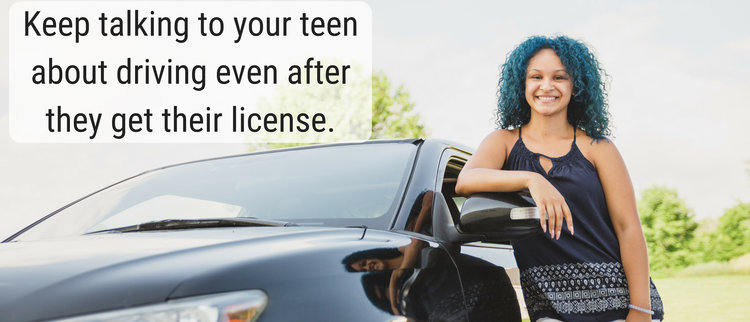Parents just want what’s best for their children, but it’s often hard to compete with the freedom and excitement a young driver feels when they get their license. Although graduated driver licensing laws now exist in every state to help teens ease into the responsibility of driving, there’s more to safety on the road than using turn signals and merging onto a highway. Young drivers must also understand how to handle situations like bad weather, unexpected distractions, and changes in the driving environment. This week is National Teen Driver Safety Week, so there’s no better time to teach your teen how to respect the rules of the road.
A great way to teach safe driving skills to your children is by taking them on a commentary drive. Start by talking to your kids about the decisions you are making while you drive. Many of the silent actions we take may not be noticed by teens learning to drive. Explain how you look for hazards, check rearview mirrors, and adjust speed for road conditions and other factors. If you feel the urge to look at your phone or reach for something you shouldn’t, tell your child. Talk about strategies to overcome these urges. Talk about how to handle other situations, like passengers who encourage dangerous driving or how easy it can be to speed. Identifying problems and offering ideas will help young drivers make good decisions when they’re behind the wheel.
Having a teen driver in the house is bound to be stressful for any parent or guardian, but by preparing them for the dangers they might encounter on the road, we can give them a better shot at staying safe. Other tips include:
- Your teen is watching you, so set a good example when you drive. Always follow traffic and safety laws. Use a seat belt every time you are in the car. Drive the speed limit. Do not drive while drowsy, impaired, or distracted.
- Check the laws in your state that apply to your child, such as limits on the number of people a teen may have in the car and the hours teens may drive.
- Ask your teen’s doctor if any of the medicine they are taking might affect driving.
- Have your teen sign a parent-teen driving contract that will set clear rules and consequences if rules are broken. Make sure the contract requires seat belt use for each person in the car at all times, no cell phones or electronic devices, and checking in with parents once the driver has safely arrived at their destination.
- Practice with your teen in difficult situations, such as driving in heavy traffic, during different weather patterns, and at night. Stay calm and patient and give helpful feedback. Offer praise when your teen makes good decisions.
More teen driving safety tips available at www.preventchildinjury.org/toolkits/national-teen-driver-safety-week.

